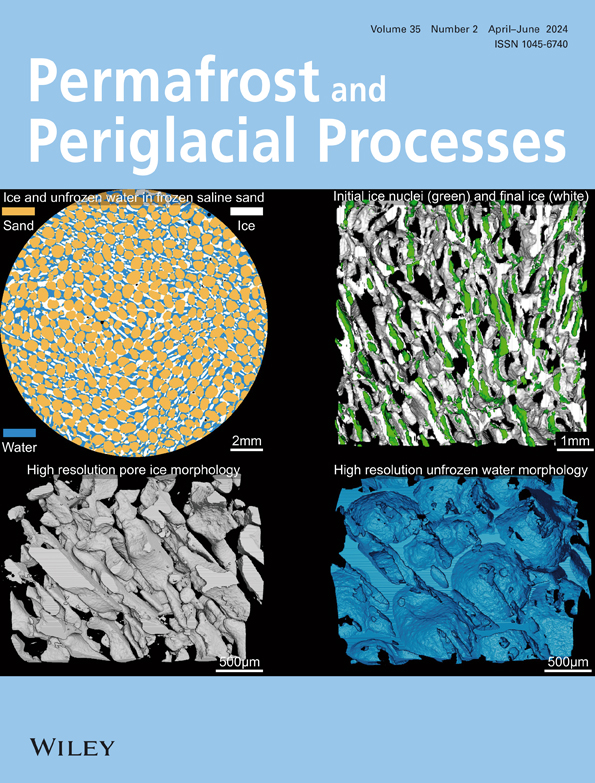Carbon‐cycling microorganisms in permafrost and their responses to a warming climate: A review
IF 3.3
3区 地球科学
Q2 GEOGRAPHY, PHYSICAL
引用次数: 0
Abstract
Abstract Global climate warming is accelerating permafrost degradation. The large amounts of soil organic matter in permafrost‐affected soils are prone to increased microbial decomposition in a warming climate. Along with permafrost degradation, changes to the soil microbiome play a crucial role in enhancing our understanding and in predicting the feedback of permafrost carbon. In this article, we review the current state of knowledge of carbon‐cycling microbial ecology in permafrost regions. Microbiomes in degrading permafrost exhibit variations across spatial and temporal scales. Among the short‐term, rapid degradation scenarios, thermokarst lakes have distinct biogeochemical conditions promoting emission of greenhouse gases. Additionally, extreme climatic events can trigger drastic changes in microbial consortia and activity. Notably, environmental conditions appear to exert a dominant influence on microbial assembly in permafrost ecosystems. Furthermore, as the global climate is closely connected to various permafrost regions, it will be crucial to extend our understanding beyond local scales, for example by conducting comparative and integrative studies between Arctic permafrost and alpine permafrost on the Qinghai–Tibet Plateau at global and continental scales. These comparative studies will enhance our understanding of microbial functioning in degrading permafrost ecosystems and help inform effective strategies for managing and mitigating the impacts of climate change on permafrost regions.冻土中碳循环微生物及其对气候变暖的响应研究进展
全球气候变暖正在加速永久冻土的退化。在气候变暖的情况下,受冻土影响的土壤中大量的土壤有机质容易增加微生物分解。随着永久冻土的退化,土壤微生物群的变化在增强我们对永久冻土碳反馈的理解和预测中起着至关重要的作用。本文综述了多年冻土区碳循环微生物生态学的研究现状。在退化的永久冻土中,微生物组在空间和时间尺度上表现出变化。在短期快速退化情景中,热岩溶湖具有独特的促进温室气体排放的生物地球化学条件。此外,极端气候事件可能引发微生物群落和活动的剧烈变化。值得注意的是,环境条件似乎对冻土带生态系统中的微生物聚集起主导作用。此外,由于全球气候与各个永久冻土区密切相关,因此将我们的理解扩展到局部尺度之外至关重要,例如,在全球和大陆尺度上对北极永久冻土区和青藏高原高山永久冻土区进行比较和综合研究。这些比较研究将增强我们对微生物在退化的永久冻土区生态系统中的功能的理解,并有助于制定有效的策略来管理和减轻气候变化对永久冻土区的影响。
本文章由计算机程序翻译,如有差异,请以英文原文为准。
求助全文
约1分钟内获得全文
求助全文
来源期刊
CiteScore
9.70
自引率
8.00%
发文量
43
审稿时长
>12 weeks
期刊介绍:
Permafrost and Periglacial Processes is an international journal dedicated to the rapid publication of scientific and technical papers concerned with earth surface cryogenic processes, landforms and sediments present in a variety of (Sub) Arctic, Antarctic and High Mountain environments. It provides an efficient vehicle of communication amongst those with an interest in the cold, non-glacial geosciences. The focus is on (1) original research based on geomorphological, hydrological, sedimentological, geotechnical and engineering aspects of these areas and (2) original research carried out upon relict features where the objective has been to reconstruct the nature of the processes and/or palaeoenvironments which gave rise to these features, as opposed to purely stratigraphical considerations. The journal also publishes short communications, reviews, discussions and book reviews. The high scientific standard, interdisciplinary character and worldwide representation of PPP are maintained by regional editorial support and a rigorous refereeing system.

 求助内容:
求助内容: 应助结果提醒方式:
应助结果提醒方式:


